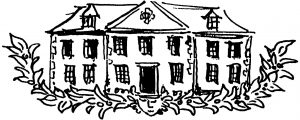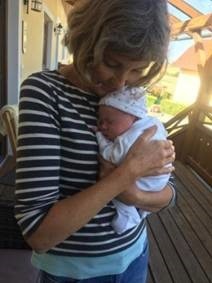September: All three of us are not long back from another memorable summer school – this time with Justin Doyle – in the excellent town of Ludlow. Each time we make more helpful contacts with the townspeople. The mayor came to the final concert to receive the Proclamation that alto Ruth Bamberger had brought with her from the city of Ludlow, Kentucky. The local singers are very supportive, offering accommodation for our scholars, putting up staging for the concert, taking part themselves even, though the jolly evening they had suggested in the Ludlow Brewery, alas, proved too difficult to organise.
Finally, we are delighted to announce that Lucy has been made a grandmother by a new arrival in Vienna, so expect a few future Lacock courses in that part of the world.
May: We’ve just put details of two courses next winter on the www.lacock.org web site. The first is our traditional winter school, held between Christmas and the New Year. This time it returns to Corsham in Wiltshire. The conductor will be Aidan Oliver, a friend and colleague of Justin Doyle’s both as a chorister at Westminster Cathedral and as a choral scholar at Kings College Cambridge. Last autumn The Wallace Collection organised a workshop on the Victoria Requiem to mark the opening of their exhibition “El Greco to Goya” and they asked us to find a conductor (and, in the event, most of the participants). Aidan’s was the name that came out of the hat and he was an immediate hit. We signed him up for the winter school there and then. His programme features two late Renaissance composers he considers unjustly neglected: Johannes Eccard and Peter Philips. Certainly they are little performed these days and we look forward to having our horizons widened.
Is there such a phenomenon as the Lacock effect? Andrew Carwood had directed a number of Lacock courses when he was made director of music at St Paul’s cathedral, despite not being an organist (he told one incredulous interviewer on the radio, “I don’t even know how to switch the thing on”). Then Justin Doyle was made principal conductor of the Berlin Radio Choir after a few dates with us. Earlier this month Carlos Aransay breezed into the course in Venice and announced that he had just been appointed conductor of the National Chamber Choir of Mexico. To cap it all, when we had only just asked Aidan Oliver to conduct the winter school, he was made chorus director of the Edinburgh Festival Chorus. These are all major international appointments, and too many to be mere coincidence. Uncanny.
Our Tuscan fortified hamlet of Gargonza proved as magical a venue as promised, and though there were a few teething problems, it looks like becoming a regular Lacock haunt. The young owner, Neri Guiccardini Corsi Salviati, is engaged in a heroic struggle to find a suitable use for his family’s inheritance and is hands-on to the extent of pouring wine (his family’s production, of course) in the restaurant when the need arose. It only occurred to me after we left that he is a descendant of Jacopo Corsi, the Florentine noble who, with Jacopo Peri, wrote the first opera, Dafne (now alas mostly lost), a decade before Monteverdi’s Orfeo.
Earlier this month we were invited to a concert in St John’s Smith Square to mark Europe Day, 9 May, a date known only to employees of the European Union. Among the other guests were a few figures from the world of music, but they seemed mainly to be staff from the embassies of the member states. The Bulgarian ambassador gave us the benefit of his views on the geopolitical situation while the orchestra waited to strike up with the overture to the Marriage of Figaro. The concert finished with the ‘European Anthem’, with everyone on their feet in the manner of a fifties cinema. At the end no one knew what to do: applause seemed inappropriate and you couldn’t just turn round and go; so we all stood there, silent and motionless, for what seemed like a whole minute. In the circumstances, a poignant and emotional adieu.
Next Sunday, 3 June, the garden at Cantax House will be open for charity (mainly Macmillan nurses and Amnesty International, under the National Gardens Scheme) from 2 to 6pm. We will all be there, either manning the gate or the tea stall, leaving Deborah talk to the hard core horticulturalists. We would love to see you if you are in the area.
January: Just back from a most enjoyable week in Ambleside, singing alternating with walking in the snow-clad fells – a good new venue, to which we’ll surely return, with a welcome sprinkling of good new singers. So the first thing we want to say is thank you to all those of you who have suggested new places or who have spread the word about Lacock courses to their friends. Keep up the good work!
We’ve just put details of two new courses on the www.lacock.org web site. The first is another August summer school in Ludlow – they work so well as a venue, the magnificent church and the town itself, that it is difficult to tear ourselves away. Now the local choral society has become very supportive and has offered to host an evening for us in The Ludlow Brewery. The theme of the course is ‘A Venetian Vespers’ with music by Monteverdi, Gabrieli and their contemporaries, and it will be an ambitious programme with divided choirs, soloists from a group of Lacock scholars, cornetts, sackbuts and the all rest; the music is symphonic in scale and it’s a sheer joy just to be able to sit in the middle of it all, with the different sonorities breaking over you from all around. Justin Doyle will direct, assisted by David Hatcher and Greg Skidmore.
The other is the much-heralded visit to Seville – a week of Guerrero and Morales under the excellent young conductor and counter-tenor Gabriel Díaz. The problem with Seville was finding a church to hold the course. The archbishop, despite having no problem with graven images, seems to have a marked antipathy to the performing arts and has placed a fatwa on polyphony in his churches – a disappointing turn of events, given that his predecessors have spent good money to commission it. The Orquesta Barroca de Sevilla has come to our rescue and is letting us use the church in the centre of the old city that they use for their rehearsals and recordings. Both Seville and Ludlow are likely to be heavily subscribed, so we’ll wait until mid February before allocating places, to ensure that we get a good balance of forces, young and old, new faces and old Lacock hands.
There seems to be a natural law that if a person looks after a church for any length of time it turns from a community asset into a private fiefdom. To us, a sexton or worse still a ‘development officer’, complete with a slick video presentation, is often a figure of dread – one lives in fear of what new obstacles he (usually) can strew in your path. It was Evelyn Waugh who claimed that servants of the religious were, as a class, of ‘abnormally low mentality’. He did not know why this should be – whether it was that good people in their charity gave jobs to those whom no others would employ, or whether, being poor, they got them cheap, or whether they welcomed inefficient service as a mortification, or whether unremitting association with people of superior virtue eventually drove sane servants off their heads.
Our series of concerts at The Music Room at Grays in Mayfair was great fun and – we may say – something of a success. Emma Kirkby kicked off in marvellous form and then came back in the audience every week to support the young singers lower down the bill until she had to go off to a job in Australia. The Lacock Scholars were stunningly good in a programme of madrigals by Monteverdi and Gesualdo and the series ended in a real climax with the celestial combination of counter-tenor and harp, a world-beater when they are musicians of the calibre of Patrick Craig and Frances Kelly. They had got together for the first time in response to our invitation, and now intend to carry on performing as a duo.
The Lacock Scholars continue to flourish (I notice that Google has classified their genre as ‘easy listening’), with performances coming up in Hampstead, Sussex University, St Cuthbert’s Earls Court and Holy Trinity Sloane Square. This weekend they are recording the six-part Requiem of Duarte Lobo. All their activities are at www.lacockscholars.org. They would particularly love your support at their next outing if you are in reach of north London. Greg Skidmore writes: “Our first concert at Christ Church Hampstead is at 6pm on Sunday 4 February. It will contain Byrd’s propers for the Feast of the Purification of the Blessed Virgin Mary (or Candlemas) as well as Sheppard’s amazing (and rarely performed) ‘Gaude, gaude, gaude Maria’ – a 14-minute mid-16th-century English powerhouse of a piece.”

